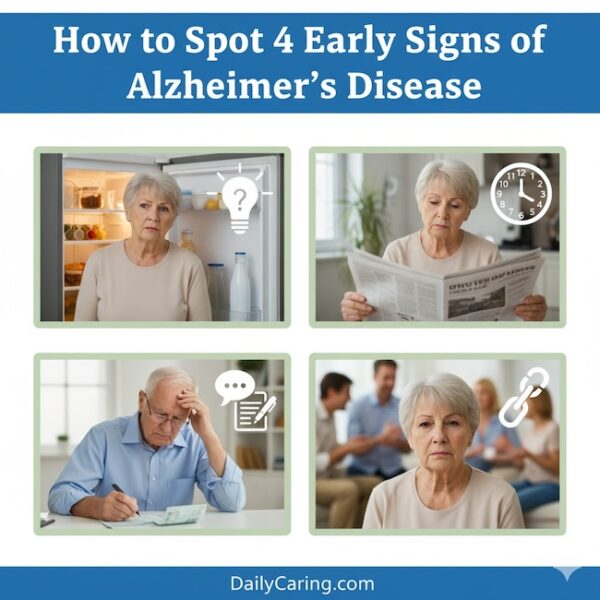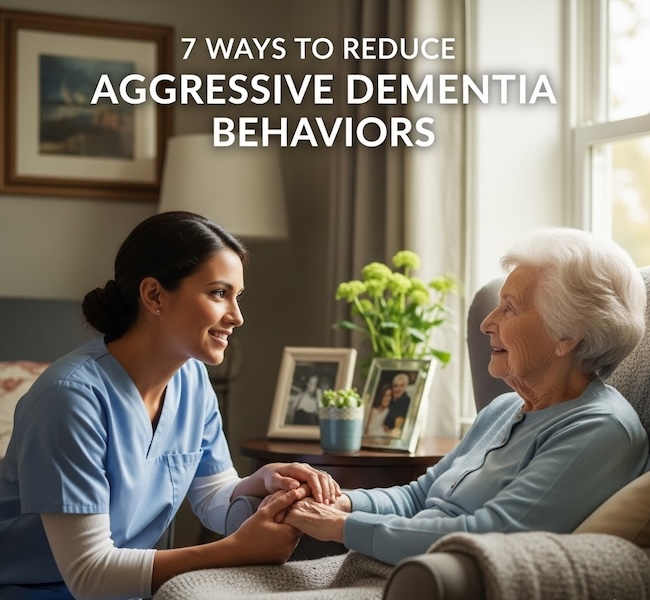That moment of walking into a room and forgetting why… It's a universal experience we often laugh off. But when does typical forgetfulness cross the line into something more? For families concerned about an aging loved one, this question can be a source of quiet anxiety.
Distinguishing between normal aging and the early, subtle signs of Alzheimer's disease is the first critical step toward getting answers and accessing support. Knowledge is power, and by learning to recognize these key differences, you can move from worry to proactive understanding, ensuring your loved one gets the compassionate care and timely intervention they may need.

Detect Alzheimer’s Disease Early for Improved Outcomes
According to the Alzheimer’s Association, an estimated 6.7 million Americans aged 65 and older are currently living with Alzheimer’s disease.
Alzheimer's disease is a progressive brain disorder that leads to a gradual decline in memory, thinking, and reasoning abilities.
While some degree of memory loss is a natural part of aging, cognitive decline that interferes significantly with daily activities may indicate Alzheimer’s disease.
Facing Alzheimer’s disease can be scary, and it's important to acknowledge that it won't disappear or improve over time.
However, early detection and diagnosis of this progressive disease can lead to more effective treatments, prolonged independence, the ability to make personal decisions, and improved overall well-being.
To help with early detection, here are four early warning signs of Alzheimer’s disease that family caregivers should watch for.
The 4 Early Signs of Alzheimer’s Disease
1. Challenges in planning or problem-solving
Individuals may experience challenges when following a familiar recipe or managing monthly bills.
They may find it hard to concentrate and take significantly longer to complete tasks than they did previously.
2. Difficulty in task completion
When individuals struggle to finish familiar tasks at home, work, or during leisure activities, it could be a warning sign of Alzheimer’s disease.
Those affected may find it challenging to navigate to familiar places, handle budgeting or work responsibilities, or recall the rules of favorite games.
3. Changes in vision and balance
In some cases, individuals may experience vision changes as an early indicator of Alzheimer’s disease.
Deteriorating vision can affect body alignment, making it difficult to maintain balance.
While this symptom is more commonly observed in the later stages of the disease, the brain changes associated with Alzheimer’s can begin to impact physical functions, including balance, as the condition progresses.
4. Significant mood and personality changes
People living with Alzheimer’s may experience changes in mood and personality. They may express confusion, suspicion, depression, fear, or anxiety.
They may also become easily upset at home, at work, with friends, or in unfamiliar environments.
What to Do if You Notice Early Signs of Alzheimer’s Disease
Initiating a conversation with your loved one about your concerns in a gentle way is a great way to approach the situation, followed by scheduling an appointment with their healthcare provider.
Ask if you can accompany them to the medical appointment to discuss your observations.
Maintaining open communication with your loved one is crucial to ensuring they feel supported and don't shy away from seeking the help they need.
Final Thoughts on the Early Signs of Alzheimer's Disease
Recognizing these early signs is not about labeling your loved one; it's about advocating for their future well-being. While this knowledge can feel daunting, it is the key that unlocks access to treatments, support systems, and the power to plan.
If you've noticed several of these changes, take a deep breath and know that the most compassionate next step is to start a conversation with their doctor. You are not alone in this journey. Your observant eye and willingness to seek clarity are profound acts of love, paving the way for a path forward built on understanding, not uncertainty.
Recommended for you:
- 5 Benefits of an Early Diagnosis of Alzheimer’s or Dementia
- How Is Dementia Diagnosed? A Geriatric Doctor Explains
- What To Do After Getting an Alzheimer’s Diagnosis
Guest contributor: Nicole Brackett is the Director of Care Delivery & Quality for Homewatch CareGivers, a Licensed Practical Nurse, CEE, and has over 32 years of experience in long-term care. Nicole is also certified by The Eden Alternative and as a Certified Dementia Care Educator. Founded in 1980, Homewatch CareGivers delivers a variety of person-directed, professional at-home services.













